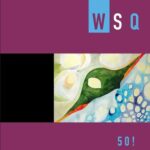 Women’s Studies Quarterly (WSQ); Kendra Sullivan and Ángeles Donoso Macaya (New York) (Web)
Women’s Studies Quarterly (WSQ); Kendra Sullivan and Ángeles Donoso Macaya (New York) (Web)
Proposals by: 15.03.2024
This special issue of Women’s Studies Quarterly is an open call, the first of its kind in the 50 years of WSQ’s history. The open call asks: Who is missing from WSQ’s discourse and how can the journal remove barriers to those already actively reworlding feminisms?
No estamos a la intemperie: An open call is one mechanism to ensure feminists who have been missing from the field and feminist discourse gain entry into the house of feminisms, a concept that Verónica Gago recovers in her reading of Carolina Meloni’s Feminismos Transfronterizos (2022): “With this very specific metaphor, Carolina Meloni’s book proposes to shelter different problems, theoretical lines, rebellious genealogies and consistent deviations from feminist thought.” Anthropologist and WSQ General Editorial Director Dána-Ain Davis conceived of the open call as a nonexclusionary framework to invite contributions from feminist actors whose theory and analysis may have been left “a la intemperie,” or “out in the open,” by even the most broadly defined thematic issues. The open call engenders horizontal expansion of the WSQ community, inviting rising stars to complicate and deepen the current constellation of thinkers, makers, and activists who have published with WSQ since its founding as a monthly newsletter by Florence Howe over 50 years ago.
The open call is unthemed. The editors invite contributions from thinkers at all stages of their careers, working out of intramural or extramural contexts, on any topic related to or urgent to feminisms. Driven by a desire to locate and uplift new and old knowledges, we are not limiting the discourse by listing topics below.
WSQ accepts submissions in all printable media, including academic articles, memoir, manifestos, literary fiction or other prose, poetry, and visual art. Especially encouraged to submit are scholars, artists, creative writers, and activists who themselves experience various forms of marginalization within nation-states in the Global North and Global South. Read more … (Web)
Source: Qstudy-l
